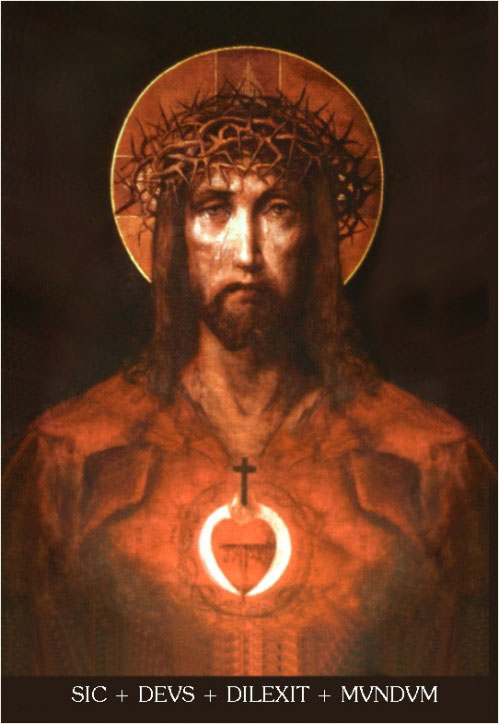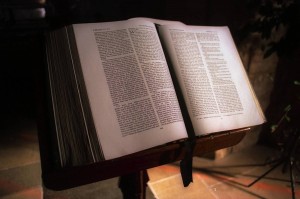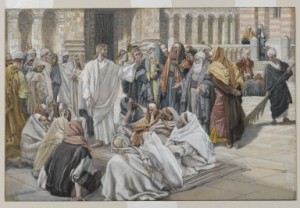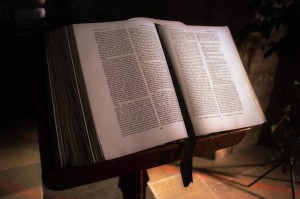“Whoever loses his life for my sake will save it”
[powerpress]
an excerpt from today’s reflection by Don Schwager:
Do you know the healing, transforming power of the cross? When Jesus predicted his passion his disciples were dismayed.  Rejection and crucifixion meant defeat and condemnation, not victory and freedom. How could Jesus’ self-denial, suffering and death lead to victory and life? Through his obedience to his Father’s will, Jesus reversed the curse of Adam’s disobedience. His death on the cross won pardon for the guilty, freedom for the oppressed, healing for the afflicted, and new life for those condemned to death. His death makes possible our freedom to live as sons and daughters of God. There’s a certain paradox in God’s economy. We lose what we gain, and we gain what we lose. When we try run our life our own way, we end up losing it to futility. Only God can free us from our ignorance and sinful ways. When we surrender our lives to God, he gives us new life in his Spirit and the pledge of eternal life. God wants us to be spiritually fit to serve him at all times. When the body is very weak or ill, we make every effort to nurse it back to health. How much more effort and attention should we give to the spiritual health of our hearts and minds!
Rejection and crucifixion meant defeat and condemnation, not victory and freedom. How could Jesus’ self-denial, suffering and death lead to victory and life? Through his obedience to his Father’s will, Jesus reversed the curse of Adam’s disobedience. His death on the cross won pardon for the guilty, freedom for the oppressed, healing for the afflicted, and new life for those condemned to death. His death makes possible our freedom to live as sons and daughters of God. There’s a certain paradox in God’s economy. We lose what we gain, and we gain what we lose. When we try run our life our own way, we end up losing it to futility. Only God can free us from our ignorance and sinful ways. When we surrender our lives to God, he gives us new life in his Spirit and the pledge of eternal life. God wants us to be spiritually fit to serve him at all times. When the body is very weak or ill, we make every effort to nurse it back to health. How much more effort and attention should we give to the spiritual health of our hearts and minds!
The cross of Jesus Christ leads to freedom and victory over sin and death. What is the cross which Christ commands me to take up each day as his disciple? When my will crosses with his will, then his will must be done. The way of the cross involves sacrifice, the sacrifice of laying down my life each and every day for Jesus’ sake. What makes such sacrifice possible and “sweet” is the love of God poured out for us in the blood of Jesus Christ. Paul the Apostle reminds us that “God’s love has been poured into our hearts through the Holy Spirit” (Romans 5:5). We can never outgive God. He always gives us more than we can expect or imagine. Are you ready to lose all for Christ in order to gain all with Christ?
“Lord Jesus, I give you my hands to do your work. I give you my feet to go your way. I give you my eyes to see as you do. I give you my tongue to speak your words. I give you my mind that you may think in me. I give you my spirit that you may pray in me. Above all, I give you my heart that you may love in me, your Father, and all mankind. I give you my whole self that you may grow in me, so that it is you, Lord Jesus, who live and work and pray in me.” (Prayer from The Grail)
for the full reflection visit : Daily Reading and Meditation
Tags: Jesus, jesus christ, Lord Jesus
This entry was posted on Thursday, March 6th, 2014 at 12:47 am
You can follow any responses to this entry through the RSS 2.0 feed.
[powerpress]
Msgr John Esseff offers the following prayers. Â Be sure to visit his website: Â www.msgrjohnesseff.net
EXAMINATION OF CONSCIENCE
FORGIVENESS PRAYER
 The following prayer covers most of the significant areas of forgiveness. Often, such a prayer will bring to mind other areas that need forgiveness. Let the Holy Spirit move freely and guide your mind to persons or groups that you need to forgive. This is especially useful before confession.
The following prayer covers most of the significant areas of forgiveness. Often, such a prayer will bring to mind other areas that need forgiveness. Let the Holy Spirit move freely and guide your mind to persons or groups that you need to forgive. This is especially useful before confession.
Lord Jesus Christ, I ask today to forgive everyone in my life. I know that You will give me the strength to forgive and I thank You that You love me more than I love myself and want my happiness more than I desire it for myself.
Father, I forgive Your for the times death has come into my family, hard times, financial difficulties, or that I thought were punishments sent by You and people said “It’s God;s will,†and I became bitter and resentful toward You. Purify my heart and mind today.
Lord, I forgive MYSELF for my sins, faults and failings, for all that is bad in myself or that I think is bad, I forgive myself. For any delvings in superstition, using ouija boards, horoscopes, going to seances, using fortune telling or wearing lucky charms, I reject all that superstition and choose You alone as my Lord and Savior. Fill me with Your Holy Spirit.
I further forgive myself for taking Your name in vain, not worshipping You by attending church, for hurting my parents, getting drunk, for sins against purity, bad books, bad movies, fornication, adultery, homosexuality. You have forgiven me, today I forgive myself.
Also for abortion, stealing, lying, defrauding, hurting people’s reputation, I forgive myself.
I truly forgive my MOTHER, I forgive her for all the times she hurt me, she resented me, she was angry with me and for all the times she prefered my brothers and sisters to me. I forgive her for the times she told me I was dumb, ugly, stupid, the worst of the children or that I cost the family a lot of money. For the times she told me I was unwanted, an accident, a mistake or not what she expected, I forgive her.
I forgive my FATHER. I forgive him for any non-support, any lack of love, affection or attention. I forgive him for any lack of time, for not giving me his companionship, for his drinking, arguing and fighting with my mother or the other children. For his severe punishments, for desertion, for being away from home, for divorcing my mother or for any running around, I do forgive him. (more…)
Tags: jesus christ, Lord Jesus
This entry was posted on Wednesday, August 1st, 2012 at 12:45 am
You can follow any responses to this entry through the RSS 2.0 feed.
“Heavenly things revealed to babes”
[powerpress]
an excerpt from today’s reflection by Don Schwager:
Do you want to know the mind and heart of God? Jesus thanks the Father in heaven for revealing to his disciples the wisdom and knowledge of God. What does Jesus’ prayer tell us about God and about ourselves? First, it tells us that God is both Father and Lord of earth as well as heaven. He is both Creator and Author of all that he has made, the first origin of everything and transcendent authority, and at the same time, goodness and loving care for all his children. All fatherhood and motherhood is derived from him (Ephesians 3:14-15). Jesus’ prayer also contains a warning that pride can keep us from the love and knowledge of God. What makes us ignorant and blind to the things of God? Certainly intellectual pride, coldness of heart, and stubbornness of will shut out God and his kingdom. Pride is the root of all vice and the strongest influence propelling us to sin. It first vanquishes the heart, making it cold and indifferent towards God. It also closes the mind to  God’s truth and wisdom for our lives. What is pride? It is the inordinate love of oneself at the expense of others and the exaggerated estimation of one’s own learning and importance.
God’s truth and wisdom for our lives. What is pride? It is the inordinate love of oneself at the expense of others and the exaggerated estimation of one’s own learning and importance.
Jesus contrasts intellectual pride with child-like simplicity and humility. The simple of heart are like “babes” in the sense that they see purely without pretense and acknowledge their dependence and trust in the one who is greater, wiser, and more trustworthy. They seek one thing – the “summum bonum” or “greatest good” who is God himself. Simplicity of heart is wedded with humility, the queen of virtues, because humility inclines the heart towards grace and truth. Just as pride is the root of every sin and evil, so humility is the only soil in which the grace of God can take root. It alone takes the right attitude before God and allows him as God to do all. God opposes the proud, but gives grace to the humble (Proverbs 3:34, James 4:6). Only the humble in heart can receive true wisdom and understanding of God and his ways. Do you submit to God’s word with simple trust and humility?
“Lord Jesus, give me the child-like simplicity and purity of faith to gaze upon your face with joy and confidence in your all-merciful love. Remove every doubt, fear, and proud thought which would hinder me from receiving your word with trust and humble submission.”
for the full reflection visit : Daily Reading and Meditation
Tags: catholic, catholic podcast, catholic prayer, cathollc spirituality, don schwager, gospel of john, Knowledge of God, Lord Jesus, sacred heart of jesus
This entry was posted on Friday, June 15th, 2012 at 12:04 am
You can follow any responses to this entry through the RSS 2.0 feed.
“You shall love God with all your heart and your neighbor as yourself”
[powerpress=”daily-scripture”]
an excerpt from today’s reflection by Don Schwager:
Why did Jesus lament and issue such a stern rebuke? Jesus was angry with the religious leaders because they failed to listen to God’s word and they misled the people they were supposed to teach and lead in the ways of God. Jesus gave a series of examples to show how misguided they were. In their zeal to win converts, they required unnecessary and burdensome rules which obscured the more important matters of religion, such as love of God and love of neighbor. They were leading people to Pharisaism rather than to God. Jesus also chastised them for their evasion of binding oaths and solemn promises. Oaths made to God were considered binding, but the Pharisees found clever ways to evade the obligation of their oaths when convenience got in the way. They forgot that God hears every word we utter and he sees the intention of the heart even before we speak or act. The scribes and Pharisees preferred their idea of religion to God’s idea. They failed as religious leaders to teach others the way of God’s kingdom because they failed to listen and to understand the intention of God’s word. Through their own pride and prejudice they blindly shut the door of their own hearts and minds to God’s understanding of his kingdom.
How can we shut the door of God’s kingdom in our lives? By closing our ears to Jesus, the King of kings and Lord of lords (Revelations 17:14; 19:16), who speaks words of life and love, truth and freedom, hope and pardon. The Lord Jesus wants to dwell with us and to bring us his kingdom. He opens the way for each of us to “ascend to heaven” and to bring “heaven to earth” in the daily circumstances of our lives. God’s kingdom is present in all who seek him and who do his will. Do you pray as Jesus taught, “May your kingdom come and your will be done on earth as it is in heaven” (Matthew 6:10)?
“Lord Jesus, your word is life for me. May I never shut the kingdom of heaven through disbelief, indifference, or disobedience. Help me to listen to your voice and to conform my life more fully to your word.”
for the full reflection visit : Daily Reading and Meditation
Tags: catholic, catholic podcast, catholic prayer, cathollc spirituality, don schwager, God's kingdom, gospel of matthew, Jesus, Lord Jesus
This entry was posted on Monday, August 22nd, 2011 at 8:21 am
You can follow any responses to this entry through the RSS 2.0 feed.
“You shall love God with all your heart and your neighbor as yourself”
[powerpress=”daily-scripture”]
an excerpt from today’s reflection by Don Schwager:
What does God require of us? Simply that we love as he loves! God is love and everything he does flows from his love for us. God loved us first and our love for him is a response to his exceeding grace and kindness towards us. The love of God comes first and the love of neighbor is firmly grounded in the love of God. The more we know of God’s love and truth the more we love what he loves and reject what is hateful and contrary to his will.
What makes our love for God and his commands grow in us? Faith in God and hope in his promises strengthens us in the love of God. They are essential for a good relationship with God, for being united with him. The more we know of God the more we love him and the more we love him the greater we believe and hope in his promises. The Lord Jesus, through the gift of the Holy Spirit, gives us a new freedom to love as he loves. Do you allow anything to keep you from the love of God and the joy of serving others with a generous heart? Paul the Apostle says: hope does not disappoint us, because God’s love has been poured into our hearts through the Holy Spirit which has been given to us (Romans 5:5). Do you know the love which conquers all?
“Lord Jesus, your love surpasses all. Flood my heart with your love and increase my faith and hope in your promises. Help me to give myself in generous service to others as you have so generously given yourself to me.”
for the full reflection visit : Daily Reading and Meditation
Tags: catholic, catholic podcast, catholic prayer, cathollc spirituality, don schwager, Faith in God, gospel of matthew, Lord Jesus, relationship with God
This entry was posted on Friday, August 19th, 2011 at 6:58 am
You can follow any responses to this entry through the RSS 2.0 feed.
“He will not break a bruised reed until he brings justice to victory”
[powerpress=”daily-scripture”]
an excerpt from today’s reflection by Don Schwager:
How do we achieve success and victory in our lives? In everyone’s life there are key moments or turning points on which the whole of one’s life hinges. The mounting confrontation between the Pharisees and Jesus was such a decisive event and crisis. The religious leaders became intolerant of Jesus because of their prejudice. Nothing that Jesus would do or say from this point on would be right in their eyes. They conspired, not simply to oppose Jesus but to eliminate him. Jesus met this defiance with courage and determination to do his Father’s will. He used the crisis to teach his disciples an important lesson for God’s way to success and victory. The only way to glory in God’s kingdom is through the cross – the cross of suffering and humiliation which Jesus endured for our sake and for our salvation. We, too, are called to take up our cross every day – to die to sin, selfishness, envy, pride, strife, and hatred – and to lay down our lives in humble service and love for one another – just as Jesus did for our sake.
Jesus brings the justice of God’s kingdom tempered with divine love and mercy. He does not bruise the weak or treat them with contempt, but rather shows understanding and compassion. He does not discourage the fainthearted but gives hope, courage, and the strength to persevere through trying circumstances. No trials, failings, and weaknesses can keep us from the mercy and help which Jesus offers to everyone who asks. His grace is sufficient for every moment, every situation, and every challenge we face. When you meet trials and difficulties, do you rely on God’s help and grace?
“Lord Jesus, your love and mercy knows no bounds. Give me strength when I am weak, hope when I am discourged, peace when I am troubled, consolation when I am sad, and understanding when I am perplexed. Make me an instrument of your love and peace to those who are troubled and without hope.”
for the full reflection visit : Daily Reading and Meditation
Tags: catholic, catholic podcast, catholic prayer, cathollc spirituality, don schwager, gospel of matthew, Lord Jesus, the Pharisees and Jesus
This entry was posted on Thursday, August 18th, 2011 at 8:01 am
You can follow any responses to this entry through the RSS 2.0 feed.
“Flesh and blood has not revealed this to you, but my Father who is in heaven”
[powerpress=”daily-scripture”]
an excerpt from today’s reflection by Don Schwager:
Who is Jesus for you? At an opportune time Jesus tests his disciples with a crucial question: Who do men say that I am and who do you say that I am? He was widely recognized in Israel as a mighty man of God, even being compared with the greatest of the prophets, John the Baptist, Elijah, and Jeremiah. Peter, always quick to respond, exclaimed that he was the Christ, the Son of the living God. No mortal being could have revealed this to Peter; but only God. Jesus then confers on Peter authority to govern the church that Jesus would build, a church that no powers would overcome.
Jesus plays on Peter’s name which is the same word for “rock” in both Aramaic and Greek. To call someone a “rock” is one of the greatest of compliments. The ancient rabbis had a saying that when God saw Abraham, he exclaimed: “I have discovered a rock to found the world upon”. Through Abraham God established a nation for himself. Through faith Peter grasped who Jesus truly was. He was the first apostle to recognize Jesus as theAnointed One (Messiah and Christ) and the only begotten Son of God. The New T estament describes the church as a spiritual house or temple with each member joined together as living stones (see 1 Peter 2:5). Faith in Jesus Christ makes us into rocks or spiritual stones. The Lord Jesus tests each of us personally with the same question: Who do you say that I am?
estament describes the church as a spiritual house or temple with each member joined together as living stones (see 1 Peter 2:5). Faith in Jesus Christ makes us into rocks or spiritual stones. The Lord Jesus tests each of us personally with the same question: Who do you say that I am?
When Jesus told his disciples that he must suffer many things, be rejected by the religious authorities in Jerusalem, and then be put to death, he also prophesied that he would be raised on the third day. Peter, always quick to respond, rejected the notion that the Messiah must suffer and be killed. This wasn’t the kind of Messiah that Peter and the Jews expected. They didn’t understand that the prophet Isaiah, some 700 hundred years before Christ’s birth, foretold that God’s Anointed One would come as the Suffering Servant who would be despised, rejected, and put to death to atone for the sins of the world [see Isaiah 52:13-15; Isaiah 53:1-12] . Jesus saw in Peter’s rejection a temptation to avoid the way of the cross which involved obedience and trust in God’s will, and voluntary suffering and sacrifice for the sake of others. Jesus rebuked not only Peter but Satan, the greatest of angels who disobeyed and refused to serve his Lord and Creator. Are you ready to follow the Lord Jesus, to suffer and die for him, that you may also share in his glory and resurrection?
“Lord Jesus, I profess and believe that you are the Christ, the Son of the living God. Make my faith strong in temptation and adversity that I may follow you faithfully as my Lord and Savior.”
for the full reflection visit : Daily Reading and Meditation
Tags: catholic, catholic podcast, catholic prayer, cathollc spirituality, don schwager, gospel of matthew, jesus christ, Lord Jesus
This entry was posted on Thursday, August 4th, 2011 at 6:01 am
You can follow any responses to this entry through the RSS 2.0 feed.
“He will not break a bruised reed until he brings justice to victory”
[powerpress=”daily-scripture”]
an excerpt from today’s reflection by Don Schwager:
How do we achieve success and victory in our lives? In everyone’s life there are key moments or turning points on which the whole of one’s life hinges. The mounting confrontation between the Pharisees and Jesus was such a decisive event and crisis. The religious leaders became intolerant of Jesus because of their prejudice. Nothing that Jesus would do or say from this point on would be right in their eyes. They conspired, not simply to oppose Jesus but to eliminate him. Jesus met this defiance with courage and determination to do his Father’s will. He used the crisis to teach his disciples an important lesson for God’s way to success and victory. The only way to glory in God’s kingdom is through the cross – the cross of suffering and humiliation which Jesus endured for our sake and for our salvation. We, too, are called to take up our cross every day – to die to sin, selfishness, envy, pride, strife, and hatred – and to lay down our lives in humble service and love for one another – just as Jesus did for our sake.
Jesus brings the justice of God’s kingdom tempered with divine love and mercy. He does not bruise the weak or treat them with contempt, but rather shows understanding and compassion. He does not discourage the fainthearted but gives hope, courage, and the strength to persevere through trying circumstances. No trials, failings, and weaknesses can keep us from the mercy and help which Jesus offers to everyone who asks. His grace is sufficient for every moment, every situation, and every challenge we face. When you meet trials and difficulties, do you rely on God’s help and grace?
“Lord Jesus, your love and mercy knows no bounds. Give me strength when I am weak, hope when I am discourged, peace when I am troubled, consolation when I am sad, and understanding when I am perplexed. Make me an instrument of your love and peace to those who are troubled and without hope.”
for the full reflection visit : Daily Reading and Meditation
Tags: catholic, catholic podcast, catholic prayer, cathollc spirituality, don schwager, gospel of matthew, Lord Jesus, the Pharisees and Jesus
This entry was posted on Saturday, July 16th, 2011 at 12:04 am
You can follow any responses to this entry through the RSS 2.0 feed.
The Seventh Thursday in Ordinary Time – from the Gospel of Mark the full reading and reflection
an excerpt from today’s reflection by Don Schwager: 
Was Jesus’ exaggerating when he urged his followers to use drastic measures to avoid evil and its harmful consequences? Jesus set before his disciples the one supreme goal in life that is worth any sacrifice, and that goal is God himself and his will for our lives which leads to everlasting peace and happiness. Just as a doctor might remove a limb or some part of the body in order to preserve the life of the whole body, so we must be ready to part with anything that causes us to sin and which leads to spiritual death. Jesus warns his disciples of the terrible responsibility that they must set no stumbling block in the way of another, that is, not give offense or bad example that might lead another to sin. The Greek word for temptation (scandalon) is exactly the same as the English word scandal. The original meaning of scandal is a trap or a stumbling block which causes one to trip and fall. The Jews held that it was an unforgivable sin to teach another to sin. If we teach another to sin, he in turn may teach still another, until a train of sin is set in motion with no foreseeable end. The young in faith are especially vulnerable to the bad example of those who should be passing on the faith. Do you set a good example for others to follow, especially the young?
What does Jesus mean when he says “have salt in yourselves”? Salt served a very useful purpose in hot climates before the invention of electricity and refrigeration. Salt not only gave food flavor, it also preserved meat from spoiling. Salt was used as a symbol of fellowship and the common meal. The n ear-Eastern expression to betray the salt meant to betray one’s Master or some person who was owed loyalty and devotion. Leonardo da Vinci in his painting of the Last Supper depicts Judas in the act of tipping over the salt shaker, thus symbolically indentifying himself as the betrayer of his Master. Jesus used the image of salt to describe how his disciples are to live in the world. As salt purifies, preserves, and penetrates, so the disciple must be as salt in the world of human society to purify, preserve, and penetrate that society for the kingdom of God and of his righteousness and peace. What did Jesus mean by the expression “salted with fire” and “salt becoming saltless”? Salt was often put in ovens to intensify the heat. When the salt was burned off and no longer useful it was thrown out on the road or on the roof top where it would easily get trodden upon. Perhaps Jesus wanted to contrast useful salt used for giving flavor and for preserving food with salt which was burned and no longer of much benefit, to encourage his disciples to be faithful witnesses and to not neglect the opportunity to influence others for the kingdom of God through the witness of their lives and their testimony to the power of the kingdom of God.
ear-Eastern expression to betray the salt meant to betray one’s Master or some person who was owed loyalty and devotion. Leonardo da Vinci in his painting of the Last Supper depicts Judas in the act of tipping over the salt shaker, thus symbolically indentifying himself as the betrayer of his Master. Jesus used the image of salt to describe how his disciples are to live in the world. As salt purifies, preserves, and penetrates, so the disciple must be as salt in the world of human society to purify, preserve, and penetrate that society for the kingdom of God and of his righteousness and peace. What did Jesus mean by the expression “salted with fire” and “salt becoming saltless”? Salt was often put in ovens to intensify the heat. When the salt was burned off and no longer useful it was thrown out on the road or on the roof top where it would easily get trodden upon. Perhaps Jesus wanted to contrast useful salt used for giving flavor and for preserving food with salt which was burned and no longer of much benefit, to encourage his disciples to be faithful witnesses and to not neglect the opportunity to influence others for the kingdom of God through the witness of their lives and their testimony to the power of the kingdom of God.
“Lord Jesus, fill me with your Holy Spirit that I may radiate the joy of the gospel to others. May your light and truth shine through me that others may find new life and freedom from sin and the corruption of evil.”
for the full reflection visit : Daily Reading and Meditation
Tags: catholic, catholic podcast, catholic prayer, cathollc spirituality, don schwager, gospel of mark, Jesus, Lord Jesus, stumbling block
This entry was posted on Thursday, February 24th, 2011 at 6:00 am
You can follow any responses to this entry through the RSS 2.0 feed.
The Seventh Monday in Ordinary Time – from the Gospel of Mark the full reading and reflection
“All things are possible to him who believes”
an excerpt from today’s reflection by Don Schwager: 
When Jesus rebuked the evil spirit, the boy, at first, seemed to get worse rather than better as he went into a fit of convulsion. Peter Chrysologus, a 5th century church father, reflects on this incident: “Though it was the boy who fell on the ground, it was the devil in him who was in anguish. The possessed boy was merely convulsed, while the usurping spirit was being convicted by the awesome judge. The captive was detained, but the captor was punished. Through the wrenching of the human body, the punishment of the devil was made manifest.†God promises us freedom from oppression, especially the oppression of sin and evil that rob us of faith, joy, and peace with God. The Lord invites us, as he did this boy’s father, to pray with expectant faith. Do you trust in God’s unfailing love and mercy?
The mighty works and signs which Jesus did demonstrate that the kingdom of God is present in him. These signs attest that the Father has sent him as the promised Messiah. They invite belief in Jesus as the Son of God and Savior of the world. The coming of God’s kingdom means defeat of Satan’s kingdom. Jesus’ exorcisms anticipate his great victory over “the ruler of this world” (John 12:31). While Satan may act in the world out of hatred for God and his kingdom in Christ Jesus, and may cause grave injuries of a spiritual nature, and indirectly even of a physical nature, his power is nonetheless limited and permitted by divine providence (Romans 8:28). Jesus offers freedom from bondage to sin and Satan. There is no affliction he cannot deliver us from. Do you make full use of the protection and help he offers to those who seek him with faith and trust in his mercy?
“Lord Jesus, help my unbelief! Increase my faith and trust in your saving power. Give me confidence and perseverance, especially in prayer. And help me to bring your healing love and truth to those I meet”.
for the full reflection visit : Daily Reading and Meditation
Tags: belief in Jesus, catholic, catholic podcast, catholic prayer, cathollc spirituality, don schwager, exorcisms, gospel of mark, Lord Jesus, Peter Chrysologus
This entry was posted on Monday, February 21st, 2011 at 12:35 am
You can follow any responses to this entry through the RSS 2.0 feed.
The Fifth Monday in Ordinary Time – from the Gospel of Mark the full reading and reflection
“Immediately the people recognized Jesus”
an excerpt from today’s reflection by Don Schwager: 
Faith is an entirely free gift which God makes to us through the power of the Holy Spirit. Believing and trusting in God to act in our lives is only possible by the grace and help of the Holy Spirit who moves the heart and converts it to God. The Holy Spirit opens the eyes of the mind and helps us to understand, accept, and believe God’s word. How do we grow in faith? By listening to God’s word with trust and submission. Faith also grows through testing and perseverance. The Lord wants to teach us how to pray in faith for his will for our lives and for the things he wishes to give us to enable us to follow him faithfully and serve him generously. Jesus gave his disciples the perfect prayer which acknowledges God as our Father who provides generously for his children. The Lord’s prayer teaches us to seek first the kingdom of God and to pray that God’s will be accomplished in our lives. The Lord in turn, gives us what we need to live each day for his glory. The Lord is never too distant nor too busy to meet us and to give his blessing. Do you pray to the Father with confidence that he will show you his will and give you what you need to follow him? Ask the Lord to increase your faith and gratitude for his merciful love and provision for your life.
“Lord Jesus, let my heart sing for joy in your presence. Give me eyes of faith to recognize your presence and fill me with your Holy Spirit that I may walk in your way of love and peace.”
for the full reflection visit : Daily Reading and Meditation
Tags: catholic, catholic podcast, catholic prayer, cathollc spirituality, don schwager, gospel of mark, holy spirit, Lord Jesus, the Holy Spirit
This entry was posted on Monday, February 7th, 2011 at 12:01 am
You can follow any responses to this entry through the RSS 2.0 feed.
The Third Monday in Ordinary Time – from the Gospel of Mark the full reading and reflection
“All sins will be forgiven except blasphemy against the Holy Spirit”
an excerpt from today’s reflection by Don Schwager: 
When danger lurks, what kind of protection do you seek? Jesus came to free us from the greatest danger of all – the corrupting force of evil which destroys us from within and makes us slaves to sin and Satan (John 8:34). Evil is not an impersonal force that just happens. It has a name and a face and it seeks to master every heart and soul on the face of the earth (1 Peter 5:8-9). Scripture identifies the Evil One by many names, ‘Satan’, ‘Be-el’zebul – the prince of demons’, the ‘Devil’, the ‘Deceiver’, the ‘Father of Lies’, and ‘Lucifier’, the fallen angel who broke rank with God and established his own army and kingdom in opposition to God. Jesus declared that he came to overthrow the power of Satan and his kingdom (John 12:31). Jesus’ numerous exorcisms brought freedom to many who were troubled and oppressed by the work of evil spirits. Jesus himself encountered personal opposition and battle with Satan when he was put to the test in the wilderness just before his public ministry (Matthew 4:1; Luke 4:1). He overcame the Evil One through his obedience to the will of his Father.
Some of the Jewish leaders reacted vehemently to Jesus’ healings and exorcisms and they opposed him with malicious slander. How could Jesus get the power and authority to release individuals from Satan’s influence and control? They assumed that he had to be in league with Satan. They attributed his power to Satan rather than to God. Jesus asserts that no kingdom divided against itself cannot survive for long. We have witnessed enough civil wars in our own time to prove the destructive force at work here for the annihilation of whole peoples and their land. If Satan lends his power against his own forces then he is finished. Cyril of Alexandria, a 5th century church father explains the force of Jesus’ argument:
Kingdoms are established by the fidelity of subjects and the obedience of those under the royal scepter. Houses are established when those who belong to them in no way whatsoever thwart one another but, on the contrary, agree in will and deed. I suppose it would establish the kingdom too of Beelzebub, had he determined to abstain from everything contrary to himself. How then does Satan cast out Satan? It follows then that devils do not depart from people on their own accord but retire unwillingly. “Satan,†he says, “does not fight with himself.†He does not rebuke his own servants. He does not permit himself to injure his own armorbearers. On the contrary, he helps his kingdom. “It remains for you to understand that I crush Satan by divine power.†[Commentary on Luke, Homily 80]
Jesus asserted his authority to cast out demons as a clear demonstration of the reign of God. God’s power is clearly at work in the exorcisms which Jesus performed and they give evidence that God’s kingdom has come.
 What kind of spiritual danger or harm should we avoid at all costs? Jesus used the illustration of a strong man whose house and possessions were kept secure. How could such a person be overtaken and robbed of his goods except by someone who is stronger than himself? Satan, who is our foe and the arch-enemy of God, is stronger than us. Unless we are clothed in God’s strength, we cannot withstand Satan with our own human strength. What does Satan wish to take from us – our faith and confidence in God and our allegiance to follow God’s law. Satan is a rebel and a liar. Satan can only have power or dominion over us if we listen to his lies and succumb to his will which is contrary to the will of God. Jesus makes it clear that there are no neutral parties in this world. We are either for Jesus or against him, for the kingdom of God or against it. There are two kingdoms in opposition to one another – the kingdom of God’s light and truth and the kingdom of darkness and deception under the rule of Satan. If we disobey God’s word, we open to door to the power of sin and Satan’s influence in our lives. If we want to live in true freedom from the power of sin and Satan, then our “house” – our mind and heart and whatever we allow to control our appetites and desires – must be occupied and ruled by Jesus Christ where he is enthroned as Lord and Savior. Do you know the peace and security of a life submitted to God and to his word?
What kind of spiritual danger or harm should we avoid at all costs? Jesus used the illustration of a strong man whose house and possessions were kept secure. How could such a person be overtaken and robbed of his goods except by someone who is stronger than himself? Satan, who is our foe and the arch-enemy of God, is stronger than us. Unless we are clothed in God’s strength, we cannot withstand Satan with our own human strength. What does Satan wish to take from us – our faith and confidence in God and our allegiance to follow God’s law. Satan is a rebel and a liar. Satan can only have power or dominion over us if we listen to his lies and succumb to his will which is contrary to the will of God. Jesus makes it clear that there are no neutral parties in this world. We are either for Jesus or against him, for the kingdom of God or against it. There are two kingdoms in opposition to one another – the kingdom of God’s light and truth and the kingdom of darkness and deception under the rule of Satan. If we disobey God’s word, we open to door to the power of sin and Satan’s influence in our lives. If we want to live in true freedom from the power of sin and Satan, then our “house” – our mind and heart and whatever we allow to control our appetites and desires – must be occupied and ruled by Jesus Christ where he is enthroned as Lord and Savior. Do you know the peace and security of a life submitted to God and to his word?
What is the basis of our hope and confidence in God? Through Jesus’ death on the cross and his victory over the grave when he rose again on the third day, Satan has been defeated and death has been overcome. We now share in Christ’s victory over sin and Satan and receive adoption as God’s sons and daughters. Through the gift of the Holy Spirit, the Lord enables us to live a new life of love and freedom from slavery to sin. The Lord Jesus is our refuge and strength because he makes his home with us (John 15:4) and gives us the power and help of the Holy Spirit. Do you take refuge in the Lord and allow him to be the Ruler of your life?
“Lord Jesus, you are my hope and salvation. Be the ruler of my heart and the master of my home. May there be nothing in my life that is not under your lordship.”
for the full reflection visit : Daily Reading and Meditation
Tags: blasphemy against the holy spirit, catholic, catholic podcast, catholic prayer, cathollc spirituality, cyril of alexandria, don schwager, evil spirits, gospel of mark, Jesus, jesus christ, Lord Jesus, prince of demons, public ministry, Satan cast out Satan
This entry was posted on Monday, January 24th, 2011 at 8:43 am
You can follow any responses to this entry through the RSS 2.0 feed.
The Second Monday in Ordinary Time – from the Gospel of Mark the full reading and reflection
“Can the wedding guests fast while the bridegroom is with them?”
an excerpt from today’s reflection by Don Schwager: 
Jesus goes on to warn his disciples about the problem of the “closed mind” that refuses to learn new things. Jesus used an image familiar to his audience – new and old wineskins. In Jesus’ times, wine was stored in wineskins, not bottles. New wine poured into skins was still fermenting. The gases exerted gave pressure. New wine skins were elastic enough to take the pressure, but old wine skins easily burst because they were hard. What did Jesus mean by this comparison? Are we to reject the old in place of the new? Just as there is a right place and a right time for fasting and for feasting, so there is a right place for the old as well as the new. Jesus says the kingdom of heaven is like a householder who brings out of his treasure what is new and what is old (Matthew 13:52). How impoverished we would be if we only had the Old Testament or the New Testament, rather than both. The Lord gives us wisdom so we can make the best use of both the old and the new. He doesn’t want us to hold rigidly to the past and to be resistant to the new work of his Holy Spirit in our lives. He wants our minds and hearts to be like new wine skins – open and ready to receive the new wine of the Holy Spirit. Are you eager to grow in the knowledge and understanding of God’s word and plan for your life?
“Lord Jesus, fill me with your Holy Spirit, that I may grow in the knowledge of your great love and truth. Help me to seek you earnestly in prayer and fasting that I may turn away from sin and wilfulness and conform my life more fully to your will. May I always find joy in knowing, loving, and serving you.”
for the full reflection visit : Daily Reading and Meditation
Tags: catholic, catholic podcast, catholic prayer, cathollc spirituality, don schwager, gospel of mark, Lord Jesus, ordinary time, prayer and fasting, wine skins, wineskins
This entry was posted on Monday, January 17th, 2011 at 3:56 am
You can follow any responses to this entry through the RSS 2.0 feed.
The Saturday After Epiphany – from the Gospel of John the full reading and reflection
“This joy of mine is now full“
an excerpt from today’s reflection by Don Schwager:
Do you know the joy of the Lord? When the associates of John the Baptist complain that all are now going to Jesus, John in his characteristic humility exclaimed that he was not the Messiah but only the messenger sent to prepare his way. John describes the Messiah as the Bridegroom and himself as the friend of the Bridegroom. The image of marriage and the wedding feast is used throughout the scriptures to describe God’s joy in his people, who are regarded as his bride. As the bridegroom rejoices over the bride, so shall your God rejoice over you (Isaiah 62:5). John acted as the best man in arranging the marriage and in making preparations for the marriage feast. John and his disciples rejoice that the Bridegroom has come to make his bride, the church, ready for the marriage feast. We see this fulfilled in the New Jerusalem in the marriage feast of the Lamb and his Bride (see Revelations 21-22). Do you look with joyful anticipation to the consummation of God’s plan for his people at the end of the ages?
“Lord Jesus, help me to fix my eyes on your kingdom and to pray with eager longing and with joyful hope for the day when your people will be fully united with you in the heavenly marriage feast. May there be no nothing in my life which might hinder me from giving you may all, you who are my joy and life”
for the full reflection visit : Daily Reading and Meditation
Tags: catholic, catholic podcast, catholic prayer, cathollc spirituality, don schwager, gospel of john, john the baptist, Lord Jesus, marriage feast
This entry was posted on Saturday, January 8th, 2011 at 9:32 am
You can follow any responses to this entry through the RSS 2.0 feed.

